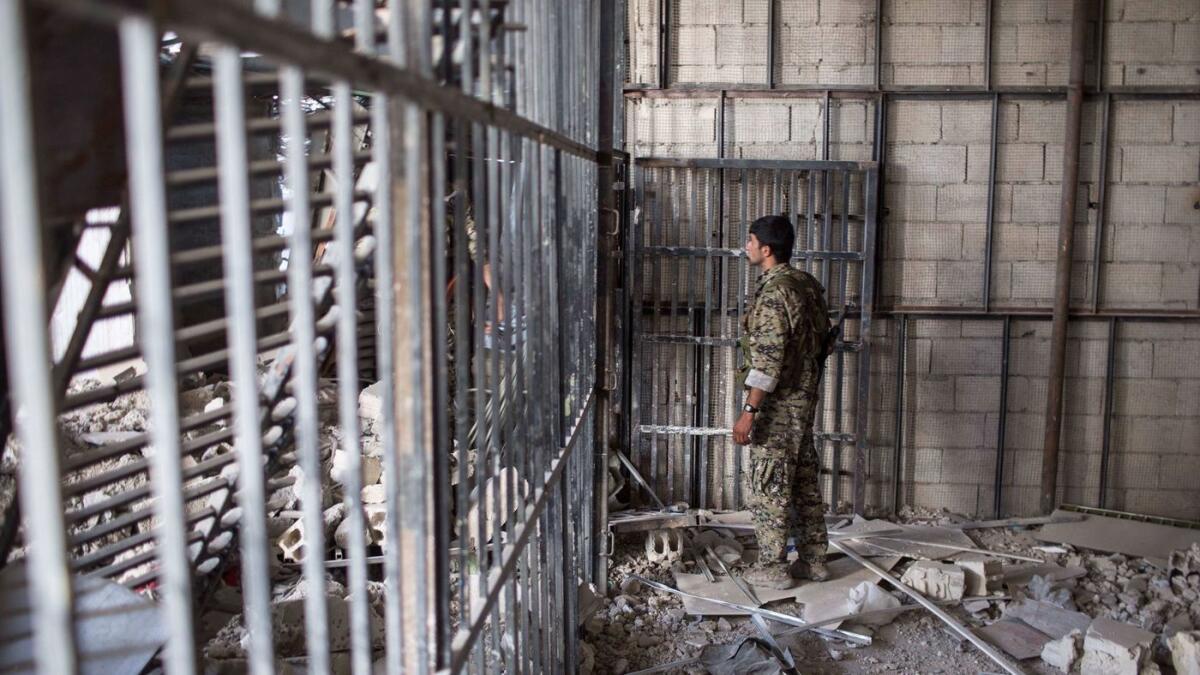Judge bars government from sending a U.S. citizen captured in Syria to Saudi Arabia

- Share via
Reporting from Washington — Trying to find its way out of a legal thicket, the Trump administration wants to send to Saudi Arabia a U.S. citizen who was captured on the battlefield in Syria last fall and is suspected of supporting Islamic State.
Lawyers for the American, who is identified only as John Doe in court papers, claim that would violate his constitutional rights and asked a federal judge to order the government either to charge him with a crime or to release him from U.S. military custody in Iraq.
On Thursday evening, U.S. District Judge Tanya S. Chutkan barred the government from transferring him, just before the deadline. During a court hearing Thursday, Chutkan seemed skeptical of government arguments that the transfer should be approved quickly.
“I have a U.S. citizen here that has rights that have to be considered carefully,” Chutkan said, adding that the right to challenge detention by the government is the “bedrock of our legal system.”
James M. Burnham, senior counsel at the Justice Department, argued that handing over the suspect would amount to a release from U.S. custody, and therefore would end his legal case in U.S. courts.
“It’s not release if you’re simply giving him over to another jailer,” Chutkan told him.
The strange case of the mystery American could set new legal and diplomatic boundaries for the U.S. war on terrorism.
Although dozens of Americans were charged and convicted of seeking to join or providing material support to terrorist groups in recent years, only a handful were designated enemy combatants. Courts ruled they still had their rights as U.S. citizens.
In September, the man surrendered to a Syrian Kurdish militia backed by the United States and was delivered to the U.S. military, which declared him an enemy combatant and put him in a military prison in Iraq.
U.S. authorities allege that the man supported Islamic State but they have been unable to produce enough evidence to charge him with a crime. He claimed that he went to Syria in early 2015 to report on the militants as a freelance journalist, and then was kidnapped by them.
Unwilling to release him, the government told the court this week that it plans to transfer the prisoner to a third country that had agreed to take him after “extensive diplomatic discussions” and “as a demonstration of its commitment” to the United States.
In a court filing, the government called it “imperative that the transfer occur quickly and smoothly.” Blocking the transfer would “undermine the U.S. credibility with an important foreign partner,” it added.
A separate court filing identified the country as Saudi Arabia, and the New York Times has reported that the man holds U.S. and Saudi citizenship.
The American Civil Liberties Union, which fought in court to gain access to the detainee while he was being held in secret last year, argues that the government cannot deliver a U.S. citizen to another country — particularly if he has not been charged with a crime in that country.
The ACLU says the man tried to escape from Islamic State and denies fighting alongside the militants. He went to Syria to “understand firsthand and report about the conflict there,” according to his attorneys.
Jonathan Hafetz, an ACLU attorney, says the forced transfer “would be an unconscionable violation of his constitutional rights.”
“The government has no legal authority to detain this U.S. citizen in the first place, and it clearly lacks any legal authority to transfer him to the custody of another government,” Hafetz said.
“When it comes to the rights of a citizen, it’s not ‘Let’s Make a Deal,’” he said.
The man talked to U.S. intelligence officers after he was taken into custody, but that evidence can’t be used in court against him. After federal agents read him his Miranda rights last year, the man asked to be provided with a defense lawyer and has not been questioned since.
Twitter: @jtanfani
UPDATES:
5:15 p.m.: This article was updated to report the judge’s decision.
2:05 p.m.: This story was updated with details from the court hearing.
This story posted at 6 a.m.
More to Read
Get the L.A. Times Politics newsletter
Deeply reported insights into legislation, politics and policy from Sacramento, Washington and beyond. In your inbox twice per week.
You may occasionally receive promotional content from the Los Angeles Times.









